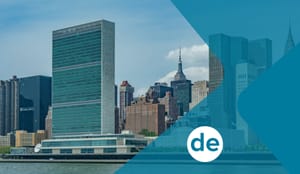ITU CWG-Internet discusses future constellation
On 4 October 2024, the 20th session of the ITU Council Working Group on Internet (CWG-Internet) took place in Geneva. Discussions included internet and sustainable development, improved connectivity in developing countries and the implementation of the Global Digital Compact (GDC). The involvement of non-governmental stakeholders is still a controversial issue. The decision on opening the CWG-Internet was postponed to the ITU Plenipotentiary Conference (2026). Russia, Uzbekistan, Belarus and Kyrgyzstan are against opening the CWG and want to review the effectiveness of global internet governance mechanisms. 19 years after the Tunis Agenda, there is still no intergovernmental UN body for internet governance. ‘We believe that the existing model for managing critical Internet resources is insufficient and that governments should take a more active role. ... The transnational nature of the Internet necessitates international regulation." The CWG-Internet could close this gap. However, the proposal was not discussed further in view of the upcoming WSIS+20 review conference.
The next four years of ITU-T
On 24 October 2024, the World Telecommunication Standardisation Assembly (WTSA) in New Delhi agreed on the next 4-year program of the ITU-T. The focus will be on standards for artificial intelligence, metaverse, virtual worlds, smart cities and for digital transformation. A new ITU-T Study Group 21 for ‘Multimedia, Content Delivery and Cable TV’ was launched. No major controversies, e.g. regarding standards for the Internet of Things (SG 20), occurred. ITU Secretary-General Bogdan-Martin was satisfied with the meeting: ‘The outcomes of WTSA-24 remind us that humanity has one Earth, one human family and one shared digital future. Together with the global standards community, ITU is committed to ensuring that our digital future is technically strong, with innovation, inclusion and sustainability at its core’. The first ‘International AI Standards Summit’, in which ITU-T, ISO, IEEE, IEC and ETSI as well as ICANN participated, had previously taken place in New Delhi from 14 to 18 October.
Freedom House Report identifies increased internet restrictions
On 16 October 2024, ‘Freedom House’ presented its annual report ‘Freedom on the Net’. Internet restrictions are increasing worldwide. For the 14th year in a row, the number of countries with limited internet freedom grew. In 2024, the situation has deteriorated in 27 out of 72 countries surveyed. There has been an increase in the criminal prosecution of individual postings on social networks, which in some countries would be punishable by up to 10 years in prison. The greatest internet freedom exists in Iceland, Estonia and Canada, while Myanmar, China and Russia are at the bottom of the list. Germany holds rank 10.
Agreement reached on protection of undersea cables
Over 80 percent of internet traffic is handled via submarine cables. These cables, which form a crucial part of the global infrastructure, are a ‘window of vulnerability’. On 26 September 2024, an agreement on the protection of submarine cables was reached for the first time on the sidelines of the 79th UN General Assembly. The ‘New York Joint Statement on the Security and Resilience of Undersea Cables in a Globally Digitalized World’ is supported by over 40 states. It defines nine principles to improve security, reliability, interoperability, sustainability and resilience in the development, repair and maintenance of these cables. These include principles for planning, construction and management, cooperation between government and industry, coordination of space and route planning, licensing, transparency and regular risk assessments.
UN Commission on Scientific and Technological Development is planning WSIS+20
On 21 and 22 October 2024, the UN Commission on Scientific and Technological Development (UNCSTD), which has been responsible for the WSIS follow-up since 2005, met in Geneva to discuss the modalities for the WSIS+20 review conference in 2025. UN Tech Envoy Amandeep Singh Gil emphasised the intergovernmental nature of WSIS+20 but assured that non-governmental stakeholders would be ‘adequately’ involved. This also applies to ITU, UNESCO and UNDP. In June 2025, two governments will be appointed as co-coordinators. One of the issues under dispute is what should be negotiated in Geneva and what in New York. Moreover, the Commission discussed the formation of the ‘UNCSTD Working Group on Data Governance’ decided by the GDC. It is planned to be established in the first quarter of 2025 and to work until the end of 2026. No agreement has yet been reached on the question whether there should be an international treaty for data governance.
BRICS summit under Russian presidency
The 16th BRICS summit took place in Kazan on 23 October 2024 under the Russian presidency in the expanded format (9 members: Ethiopia, Egypt, Brazil, China, India, Iran, Russia, South Africa, UAE plus over 30 candidates, including Saudi Arabia and Turkey). No concrete resolutions were passed. The statements on cyber security and the digital economy in the 33-page ‘Kazan Declaration’ are very general. The Declaration supports the UN Convention against Cybercrime. It requests the OEWG to become the central intergovernmental negotiating body for cyber security within the UN. BRICS intends to undertake unspecified activities ‘to ensure the integrity, stability of the functioning and security of national segments of the Internet while respecting national legislative frameworks’. Neither the GDC nor the IGF or WSIS+20 are mentioned. With regard to the digital economy, the paper refers to BRICS initiatives established years ago, such as the ‘Partnership for the New Industrial Revolution (PartNir)’ or the ‘BRICS Start Up Forum’, which have so far been unable to produce any results. As to AI, the UN is assigned a central role. The paper supports the UN resolution on capacity building for AI introduced by China.
Initiative against new payment systems and for net neutrality
On 29 October 2024, more than a dozen non-governmental stakeholders wrote to the designated EU Digital Commissioner Henna Virkkunen calling on her to stand up for a free and open internet and to reject attempts by large telcos to introduce new payment systems (fair-share, cost-sharing, network fees, or sender pays), invoking the principle of ‘network neutrality’. ‘All these fundamentally represent the same concept: of altering the Internet's networking model in favor of a handful of large telecom operators. We strongly oppose these proposals that we believe are not only unnecessary, but also extremely harmful to the global Internet and its users... Any recommendations must be based on evidence and stakeholder input.’
US expresses reservations about UN Convention against Cybercrime
On 29 October 2024, six senators of the US Congress sent a letter to US Secretary of State Blinken and US Security Advisor Sullivan expressing their reservations about the UN Convention against Cybercrime (August 2024). ‘We fear the Convention will legitimize efforts by authoritarian countries like Russia and China to censor and surveil internet users, furthering repression and human rights abuses around the world... As the UNGA considers the Convention, the United States must not align itself with repressive regimes by supporting a Convention that undermines human rights and U.S. interests.’













